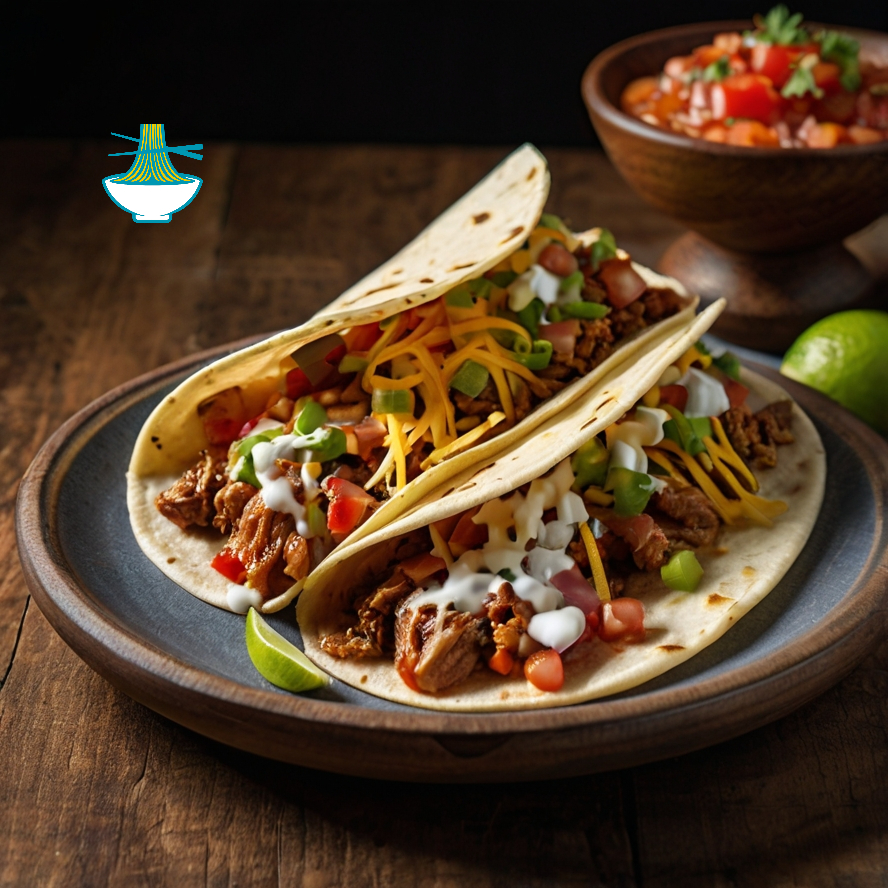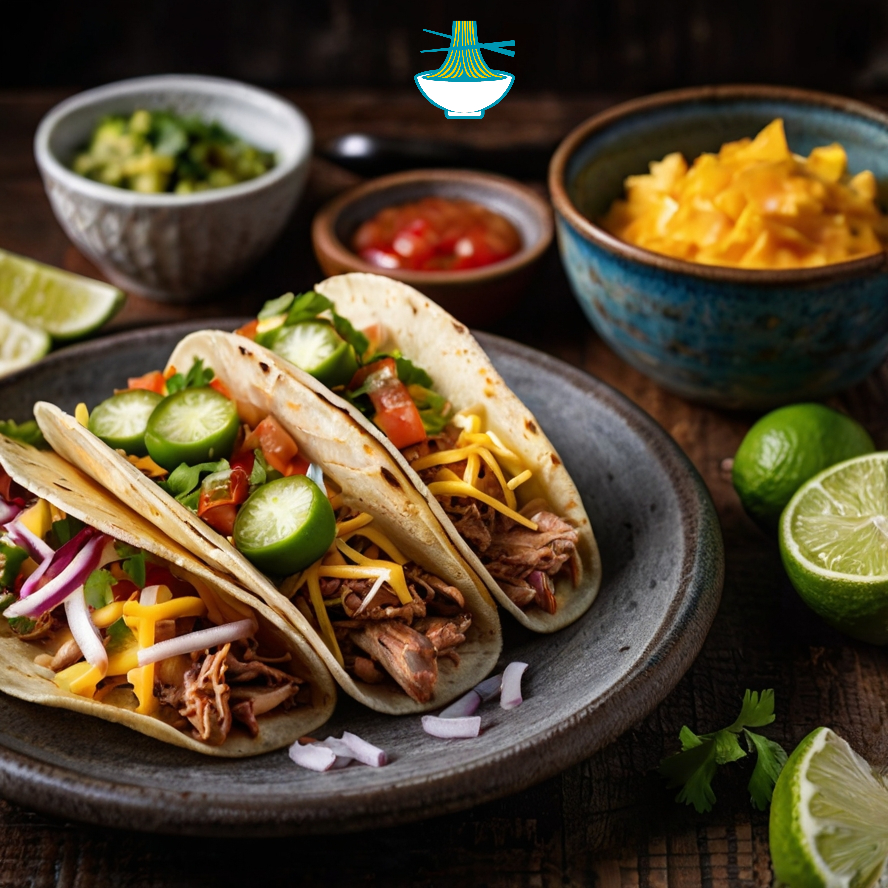Tacos are a quintessential Mexican dish that has gained worldwide popularity for its delicious and versatile nature. Originating in Mexico, tacos consist of folded or rolled corn or flour tortillas filled with a variety of ingredients such as meats (beef, chicken, or fish), beans, cheese, lettuce, and salsa. The history of tacos dates back centuries, with indigenous Mexican cultures using maize as a staple food and creating tortillas as a convenient way to wrap and consume ingredients.
Over time, tacos evolved with the introduction of different fillings and condiments, reflecting regional tastes and influences. They became a symbol of Mexican cuisine, celebrated for their flavorful combinations and customizable options. Today, tacos are enjoyed globally, with countless variations and creative twists that continue to captivate food enthusiasts worldwide.
Ingredients:
- Corn or flour tortillas
- Beef, chicken, or fish (cooked and shredded or sliced)
- Beans (cooked and mashed or whole)
- Cheese (grated or sliced)
- Lettuce (shredded)
- Salsa (store-bought or homemade)
Method of preparation
1. Heat the tortillas in a skillet or microwave until warm and pliable.
2. Fill each tortilla with your choice of meat, beans, cheese, lettuce, and salsa.
3. Fold or roll the tortilla to enclose the filling.
4. Optionally, heat the filled tacos in a skillet or oven to melt the cheese.
5. Serve hot with additional salsa or toppings as desired.
Nutrition Value:
1. Corn or Flour Tortillas:
- Calories: Typically around 60-100 calories per tortilla, depending on size and brand.
- Carbohydrates: About 10-20 grams per tortilla.
- Protein: 1-3 grams per tortilla.
- Fat: 1-3 grams per tortilla.
- Sodium: Around 100-200 milligrams per tortilla.
- Cholesterol: Usually zero cholesterol in tortillas.
- Vitamins and Minerals: Contains small amounts of calcium, iron, and B vitamins.
- Nutritional Benefit: Provides energy from carbohydrates and some protein, with minimal fat and cholesterol.
2. Beef, Chicken, or Fish (cooked and shredded or sliced):
- Calories: Varies based on type and cooking method. Beef can range from 150-250 calories per serving, chicken around 100-200 calories, and fish around 100-150 calories.
- Carbohydrates: Minimal to none, depending on marinades or sauces.
- Protein: High protein content, ranging from 20-30 grams per serving.
- Fat: The amount depends on the cut and cooking method, typically 5-15 grams per serving.
- Sodium: Can vary significantly based on seasoning and preparation.
- Cholesterol: Beef and some cuts of chicken can have higher cholesterol content, while fish is generally lower.
- Vitamins and Minerals: Good source of B vitamins, iron, zinc, and potassium.
- Nutritional Benefit: Provides essential amino acids, iron, and other minerals crucial for muscle function and overall health.
3. Beans (cooked and mashed or whole):
- Calories: Around 100-150 calories per half-cup serving.
- Carbohydrates: Approximately 20-30 grams per serving.
- Protein: 7-10 grams per serving.
- Fat: Minimal, usually less than 1 gram per serving.
- Sodium: Can vary depending on preparation, often around 200-300 milligrams per serving.
- Cholesterol: Zero cholesterol in beans.
- Vitamins and Minerals: Rich in fiber, folate, potassium, and magnesium.
- Nutritional Benefit: High fiber content aids digestion, regulates blood sugar levels, and supports heart health.
4. Cheese (grated or sliced):
- Calories: Varies widely based on type and amount, ranging from 70-120 calories per ounce.
- Carbohydrates: Minimal, less than 2 grams per ounce.
- Protein: 5-7 grams per ounce.
- Fat: Around 5-10 grams per ounce, depending on the cheese type.
- Sodium: Can be significant, especially in processed cheeses.
- Cholesterol: Varies by type, with some cheeses being higher in cholesterol.
- Vitamins and Minerals: Good source of calcium, phosphorus, and vitamin A.
- Nutritional Benefit: Provides calcium for bone health and protein for muscle maintenance.
5. Lettuce (shredded):
- Calories: Extremely low, about 5-10 calories per cup.
- Carbohydrates: Minimal, less than 1 gram per cup.
- Protein: Negligible, less than 1 gram per cup.
- Fat: Almost none, typically less than 0.1 grams per cup.
- Sodium: Very low, less than 5 milligrams per cup.
- Cholesterol: Zero cholesterol in lettuce.
- Vitamins and Minerals: Excellent source of vitamin K, vitamin A, and folate.
- Nutritional Benefit: Provides vitamins and minerals with virtually no calories, great for adding volume and nutrients to meals.
6. Salsa (store-bought or homemade):
- Calories: Can range from 10-50 calories per serving, depending on ingredients and portion size.
- Carbohydrates: Varies based on recipe, typically around 2-5 grams per serving.
- Protein: Minimal, less than 1 gram per serving.
- Fat: Very low, often less than 1 gram per serving.
- Sodium: Depends on recipe and added salt, typically around 100-300 milligrams per serving.
- Cholesterol: Usually zero cholesterol in salsa.
- Vitamins and Minerals: Contains vitamin C, vitamin A, and antioxidants from ingredients like tomatoes, onions, and peppers.
- Nutritional Benefit: Provides flavor without many calories, and the vegetables contribute vitamins and antioxidants to the dish. Homemade salsa can be tailored to control sodium content and use fresh, nutritious ingredients.


Comments